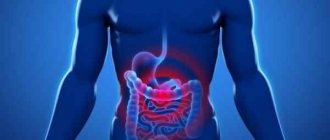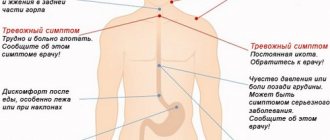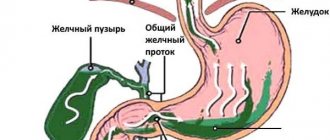Causes of stomach pain and nausea
Unpleasant signs arise for many reasons. They are divided into everyday and pathological. The first include:
- poor nutrition;
- alcohol abuse;
- binge eating;
- use of certain medications;
- nervous, emotional overstrain.
A person feels fullness in the stomach, heaviness, accumulation of gases, and belching. These signs are easy to combat at home. Over time they disappear.
Diseases that are accompanied by nausea
Sometimes stomach pain and vomiting occur due to eating poor quality food. In this case, diarrhea occurs, the temperature rises, and dehydration occurs.
If the symptoms bother you often, then these are signs of more serious problems that require immediate examination, correct diagnosis, and treatment.
The nature of the pain allows us to determine what disease caused it:
- One of the most common is gastritis. It is characterized by aching pain in the stomach area. Eating spicy, fatty foods provokes heaviness, vomiting, and nausea. Belching, heartburn, and an unpleasant taste in the mouth appear. The patient has difficulty defecating. Constipation gives way to diarrhea.
- Gastric and duodenal ulcers have similar symptoms. The pain varies in duration. They last from several hours to several days. The patient feels discomfort on the right.
- Stomach cramps appear with pancreatitis. They cause severe pain. Their character is sharp and cutting. The patient feels dry mouth. A yellow coating appears on the tongue. Nausea and vomiting with bile and food residues occur. Constipation gives way to diarrhea.
- Polyps that do not manifest themselves at first. As they grow, pain appears in the area of the shoulder blades and lower back. They intensify during meals.
- A spasm in the stomach, which is accompanied by nausea or vomiting, occurs with a disease called appendicitis. They are rapidly intensifying. The patient complains of pain in the right abdominal region. Body temperature rises sharply. Surgery is the only treatment option.
- The most serious and dangerous disease is stomach cancer. There are 4 stages of the disease. The symptoms of each are different . In stage 1, the patient experiences increased fatigue and an aversion to meat dishes. Anemia sets in. Weight loss is observed. Then comes stomach pain and regurgitation. The patient is constantly nauseous. At stage 3, the patient experiences obstruction and belches, which smells like rotten eggs. At stage 4, the pain is so strong that only a narcotic pain reliever can reduce it.
Preventive actions
To prevent stomach pain, diarrhea and vomiting, the most basic requirements must be observed. You should only eat fresh, heat-treated foods.
Eat slowly, chew food well, and do not overeat. Do not overuse fried, fatty, smoked and spicy foods. Do not forget to wash your hands, vegetables and fruits with soap before eating. Remember that alcoholic drinks and smoking have a bad effect on the human body.
https://youtu.be/xzb9zuRcZNU
Why do you feel sick after eating?
Stomach upset, nausea and vomiting are unpleasant symptoms. They indicate trouble in the human body. One of the reasons for their appearance is indigestion, which occurs from overeating.
The stomach is not able to digest large amounts of food. Therefore, his motor skills are impaired. Instead of moving food into the intestines, it pushes it into the esophagus and oral cavity.
Overeating does not always end in vomiting. To avoid discomfort and nausea, you need to perform the following procedures:
- Provide the body with an influx of fresh air. To do this, open the windows and go out into the fresh air.
- Drink a glass of still water. It should be at room temperature. Hot drinks should not be consumed.
- Give your body a comfortable position and relax.
- Take medications. Motilium and Mezim will help relieve the symptom of nausea.
After the attack is over, you need to pay attention to nutrition. Avoid spicy and fatty foods. Limit sweets and alcoholic drinks. Eat food in small portions, 5-6 times a day.
Abdominal pain due to taking vitamins
Oddly enough, abuse or misuse of certain vitamin complexes can lead to vomiting, and, consequently, pain in the abdomen.
Improper intake of vitamins often provokes negative reactions in the body, such as nausea, vomiting, and abdominal pain.
Vitamin complexes are used to improve the general condition of the body and strengthen the functionality of the immune system. Very often, experts prescribe taking vitamins in parallel with medications. If the dosage regimen is violated, side effects often occur in the form of weakness, nausea, developing into vomiting, and abdominal pain.
The danger of excess vitamins
The duration of the above symptoms will depend on how quickly self-cleansing occurs in the body. That is, through vomiting, all the contents of the stomach will be removed. If you feel unwell, experts recommend inducing vomiting yourself by first drinking a large amount of water. Thus, excess amounts of vitamins or inappropriate medications will stop the harmful effects on the body and will be eliminated. In this case, you do not need to take any medications.
If you overdose on medications or vitamins, induce vomiting to empty your stomach.
Advice. Once your condition has been restored, you can drink chamomile-mint tea to improve the disturbed digestion process.
It is worth noting that some antibiotics and other medications have side effects such as abdominal pain, dizziness, nausea, and others. For example, a similar condition can be triggered by cough medications. Therefore, it is very important to study the instructions in detail before taking the product.
Cough medications often cause side effects such as nausea, dizziness, and abdominal pain.
Important! Some drugs are to be taken before eating, while others are to be taken only after eating. This is one of the important factors that helps to avoid side effects on the body.
Why do you feel sick in the morning?
The reasons why nausea occurs in the morning are different. Here are some of them:
- An inflammatory process in the esophagus called esophagitis. Nausea occurs before eating and sometimes continues after eating. The patient complains of a feeling of a lump behind the sternum, in the throat.
- Inflammation of the gastric mucosa, gastritis. Painful sensations bother a person in the morning. They often occur after eating spicy, smoked, fatty foods. The disease is a harbinger of other pathologies. These include duodenal and gastric ulcers.
- Inflammation of the duodenum. The pain goes away after breakfast.
- Intense nausea, profuse vomiting, sharp, excruciating pain in the upper abdomen are signs of pancreatitis. The disease poses a threat to human life. If symptoms appear, you should urgently call an ambulance.
- Nausea, which ends in vomiting of bile, is a sign of cholecystitis, a disorder of biliary motility. In this case, consultation with a gastroenterologist is necessary.
- Morning sickness and vomiting occur in the event of a hypertensive crisis. Many patients believe that they have food poisoning. They drink activated charcoal and are in no hurry to seek medical help. The result of this behavior is a stroke or heart attack.
Physiological signs
If you feel slightly nauseous in the morning or during the day, and the abdominal pain is not too severe, the problems are accompanied by heartburn and mild weakness, then this may be a consequence of the following conditions:
- pregnancy - nausea is especially characteristic of the 1st trimester, occurs in the vast majority of women and does not require drug therapy. If nausea causes significant discomfort and leads to severe vomiting after the first 3 months, you should consult a doctor;
- ectopic pregnancy - along with nausea, is accompanied by severe pain a few weeks after conception. If the symptoms are ignored, the woman may die;
- stomach upset due to alcohol or spicy, too fatty foods. It occurs a few hours after consumption, or in the morning. Alcohol poisoning is often accompanied by severe headaches in the morning and even fever;
- Sometimes the pain is caused by stress.
The first thing to do if you have pain and nausea for more than 1 week is to consult a doctor. This is necessary to identify dangerous causes of the condition.
Causes of pain and nausea in girls and women
In addition to diseases of the stomach, intestines, pancreas and gall bladder, the following causes cause discomfort, nausea or vomiting in women and girls:
- Stress, anxiety, depression. In this case, the doctor prescribes sedatives.
- Diet for weight loss. Dietary restrictions and changes in habitual lifestyle provoke stomach cramps and nausea.
- Vegetative-vascular dystonia.
- Impaired brain function.
- Pregnancy. In the early stages, the gag reflex occurs in more than 50% of women.
- Premenstrual syndrome.
Pain due to appendicitis
In the right lower abdomen are located:
- appendix;
- ovaries and fallopian tubes in women;
- bladder and ureters.
If sharp pain appears, concentrated on a specific point, or high temperature, the patient should be taken to a medical facility. A condition where the stomach hurts in the navel area and nausea is considered a symptom of appendicitis.
Discomfort and accompanying nausea are a sign of intestinal pathologies caused by various reasons - infections, helminthic infestations.
Kidney stones can cause discomfort as stones pass down the ureters.
When to see a doctor
The appearance of nausea, vomiting, and stomach pain indicates the presence of a serious illness. Timely consultation with a specialist will help put the body in order . He will explain what to do if unpleasant symptoms appear.
You should consult a doctor if the following signs appear:
- Prolonged attacks.
- Unbearable pain.
- Bleeding in women.
- Pain in the scrotum in men.
- Temperature increase.
- Dark feces
- I often feel dizzy.
- Paleness of the skin.
- Urinary retention.
- Difficulty defecating.
- Blood inclusions in stool, vomit.
- Nagging pain in the lower abdomen in a pregnant woman.
What is prohibited?
To avoid complications, if you experience pain in the abdominal area accompanied by nausea, you should call a doctor.
In case of severe nausea and severe pain, it is recommended to immediately call a doctor rather than self-medicate.
If the cause of the painful condition is unknown, then the following actions are prohibited:
- taking medications to block vomiting;
- taking painkillers;
If the cause of the pain is unknown, it is better not to take any analgesics or antiemetics until the doctor arrives.
- gastric lavage for children;
- consumption of food and drinks;
- abstinence from water.
In case of severe pain and nausea, you should refrain from food, sweet and carbonated drinks, but it is recommended to drink clean water without gas in sufficient quantities
Very often, pain in the abdomen and nausea occur against the background of a stressful situation, so it is enough to normalize the state of the nervous system and rest.
Pain relievers
A specialized specialist will prescribe the necessary examination. He will determine what pathology contributed to the appearance of cramps in the stomach, nausea, and vomiting. Then he will prescribe medication.
The following medications relieve pain:
- No-shpa. The medicine is used for gastroduodenitis, stomach and duodenal ulcers, cholelithiasis. Indications for use are cholecystitis, colitis, and some other diseases.
- Ibuprofen. The capsules have an analgesic and anti-inflammatory effect.
- Papaverine. A drug that has an antispasmodic, hypotensive effect.
For stomach diseases, Omeprazole, De-Nol, Almagel, Maalox are used. Peptic ulcer disease is treated with Phosphalugel, Vicain, Gaviscon.
These medications regulate acidity. They contain anti-inflammatory components and antibiotics.
Inflammation of the pancreas is treated with enzyme preparations. These include Festal, Pancreatin, Creon, Mezim, Pangrol.
These medications relieve belching, heaviness, and constipation. They restore the motility of the stomach and intestines.
Medicines for digestive problems
It should be noted right away that you cannot treat stomach pain on your own. All medications are used strictly as prescribed by the doctor. Depending on the cause of the pain, the doctor may prescribe the following medications:
- To regulate stomach acidity: Rennie, Maalox, Almagel, Omeprazole, Gaviscon, Phosphalugel, Vikalin, Omez, Famotidine, Ranitidine. These drugs are mainly used to eliminate vomiting and treat stomach pain due to gastroenterological diseases.
- Increasing the breakdown of food with a lack of enzymes: “Mezim”, “Pancreon”, “Betaine”, “Ipental”, “Wobenzym”, “Enzistal”, “Pangrol”, “Creon”, “Kadistal”, “Pancreatin”, “Penzital” , “Kotazim Forte”, “Panzinorm”, “Digestal”, “Festal”, “Pankral”, “Pankurmen”. They help improve intestinal function: relieve heaviness in the stomach, reduce the accumulation of gases, eliminate belching, and eliminate constipation.
- Promoting relaxation of smooth muscles: “Papaverine”, “No-shpa”, “Spazoverine”, “Sparex”, “Neobutin”, “Papazol”, “Trimedat”, “Duspatalin”, “Iberogast”, “Plantex”, “Meteospasmil” , “Niaspam”, “Bespa”, “Drotaverine”. They are used for nausea, vomiting and stomach pain with irritable bowel syndrome, peptic ulcer, biliary dyskinesia.
- To improve gastric motility: Motilium, Passazhiks, Ganaton, Motilak, Trimedat, Itomed. They help eliminate vomiting, improve bowel function, eliminate the feeling of fullness in the abdomen, and stop hiccups and nausea.
- Reducing toxicosis during pregnancy: vitamin complexes, Motilium, Essentiale, No-shpa, Splenin, Sepia.
In case of minor food poisoning, to eliminate unpleasant consequences, take activated carbon, using the attached instructions.
Can home remedies help?
The patient’s condition, if he is bothered by severe pain, nausea and vomiting, will be alleviated by the following actions:
- The person must take a horizontal position.
- Clothing should be loose and not compress the epigastric area.
- It is necessary to give the patient still water.
- He should stop eating.
Traditional medicine provides effective assistance for various types of diseases:
- Stomach pain in young children is relieved with a warm cleansing enema. Add 1 tablespoon of dried chamomile flowers to a glass of boiling water. Insist for half an hour.
- An inflammatory process in the stomach, an exacerbation of a chronic disease, is treated with herbal tea. It consists of yarrow, St. John's wort, oak bark, and immortelle. Herbs, taken in equal proportions, are brewed in a glass of boiling water. Leave for 1.5 hours. Take three times a day. Each dose is 4 tablespoons.
- White cabbage juice is used in cases where a feeling of discomfort occurs after eating. They drink it for three weeks, 3 times a day, 3 or 4 tablespoons. The vegetable is a preventative against the occurrence of erosive lesions of the gastric mucosa.
- Treatment of stomach ulcers is supplemented by drinking a decoction of white mistletoe. The raw materials are used in dried form. It is brewed in water. The decoction is used as a remedy that prevents the occurrence of spasms and pain.
- Sugar is replaced with natural honey. The product is useful for stomach neurosis. It relieves spasms and prevents nausea.
- Drinks made from chamomile, calendula, and rose hips replace tea. They relieve unpleasant symptoms.
Unconventional methods of treatment
In case of mild poisoning, when the first symptoms appear (vomiting and stomach pain), and there are no other warning signs, you can try using folk remedies. To do this, you need to drink water and empty your stomach of poor-quality food, causing vomiting. To relieve pain, use infusions and decoctions of the following herbs:
- Chamomile – for a decoction, take one teaspoon of flowers per glass of water. The anti-inflammatory and sedative is drunk in small sips.
- Cumin - an infusion of herbs relieves unpleasant symptoms after vomiting and stomach pain. To prepare it, take a tablespoon of spice and pour a glass of hot water.
- Peppermint - a decoction is prepared from one teaspoon of dry raw materials per glass of water. Drink instead of tea, helps relieve spasms, headaches, and acts as a sedative.
- St. John's wort - take a tablespoon of decoction every four hours. Relieves pain and eliminates vomiting.
- Ivan-tea is a decoction made from dry raw materials, drunk instead of tea. It envelops the gastric mucosa and helps eliminate vomiting and pain in the stomach.
There are many other recipes in folk medicine to alleviate the condition. It is not advisable to use them without the advice of a doctor, so as not to harm your health. The use of alcohol tinctures, decoctions of wormwood, plantain, flax seeds, propolis, plums, and gooseberries can sometimes worsen the condition. And when carrying a child, using home remedies for treatment without consulting a doctor is strictly prohibited. At home, the patient should be kept at rest, placed in a well-ventilated room, put on loose clothing, and have a light, circular massage around the navel in a clockwise direction. Temporarily do not eat any food, replacing it with plenty of fluids.
Prevention measures
In order to prevent relapses of gastrointestinal diseases, a number of preventive measures have been developed. They help prevent pain, cramps, nausea, and the gag reflex.
Preventive measures include strict adherence to the diet and giving up bad habits. They include:
- Careful use of medications that negatively affect the gastric mucosa.
- To give up smoking.
- Alcohol is allowed to be consumed only in small quantities.
- It is important to be careful about your diet and food quality.
Classification
The nature of the pain syndrome will help the clinician learn more about what disease may have caused the appearance of such symptoms. Thus, stomach pain is divided into:
- aching;
- cutting;
- dagger;
- bursting;
- sharp;
- cramping;
- pulling
- stupid.
Pain in the epigastrium and nausea can be expressed constantly or periodically.
In addition, during diagnosis, the doctor pays attention to the time of onset of symptoms. Nausea and pain occur:
- on an empty stomach;
- directly while eating food;
- some time after the meal. After eating, it can take from fifteen minutes to several hours for such signs to appear;
- at night, which significantly reduces the quality of sleep.
Diet food
Therapeutic measures, which include diet, play a big role in normalizing digestion. They help cope with nausea, stomach pain, and prevent relapses. The gastroenterologist will help the patient create the right menu . He will give all the necessary recommendations on the time and volume of food consumed.
In order to support the digestive system and give it the opportunity to recover, you need to eat food that is cooked in a double boiler or baked. It is necessary to limit the amount of salt.
Fried, salted, smoked, and fatty foods are excluded from the diet. The number of calories is limited to 2300.
First and second courses
Dietary meals include the preparation of soups. They are cooked in vegetable broth. Add rice and vermicelli. The soup is seasoned with a small amount of butter and cream.
The second courses are made from lean meats. It is allowed to eat boiled or baked rabbit, turkey, and chicken.
Butter bread is excluded from the diet.
Dairy
Consuming milk, low-fat cottage cheese, and kefir has a positive effect on the condition of the stomach and intestines.
Baked cheesecakes, scrambled eggs, and porridge with milk add variety to your diet.
Diet therapy for disorders of the digestive system
Diet for vomiting and stomach pain plays an important role in the treatment of the disease. First of all, you need to limit the amount of food you consume. Eat only food that is gentle and does not irritate the stomach. It should be taken in small portions. Avoid eating spicy, salty, sour and fatty foods, and do not eat fried or smoked foods. All food must be boiled or steamed. The diet should not contain alcohol, carbonated drinks, pickled foods, cucumbers, mushrooms, cabbage, nuts, seeds, sauces, coffee, chocolate, or rich bread.
Instead, for nutrition, use various cereals, low-fat soups, boiled unleavened meat, poultry, fish, cottage cheese, fermented milk products, jelly, jelly, carrots, beets, eggs. In the morning you can drink a glass of still mineral water. Constantly monitor to avoid overeating. Your doctor or nutritionist will help you develop a diet. The list of products for each patient is selected individually depending on the disease and the individual characteristics of the body. Dietary nutrition will help get rid of nausea, vomiting and stomach pain.











